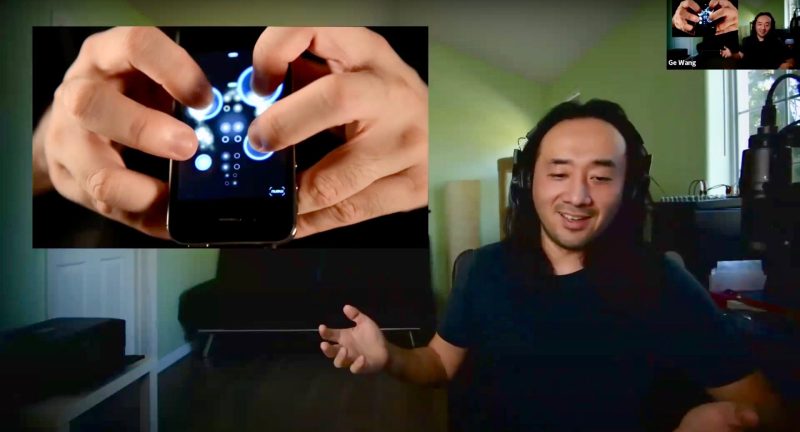Nestled on campus between Florence Moore Hall, Lake Lagunita and the Upper Row, a quaint mansion perches atop a grassy hill. Fondly dubbed “Karma” by its users, Stanford’s Center for Computer Research in Music and Acoustics (CCRMA) shepherds several multi-disciplinary programs that employ computers for sound production and technological advancement. Amid its staff is associate professor Ge Wang, the director of the Stanford Laptop Orchestra (SLOrk), leader of CCRMA’s virtual reality (VR) lab, creator of several apps and a deviser of the ChucK coding language — among other titles. In his July 3 Summer Session webinar “Technology in Search of the Sublime,” Wang conveyed what exactly exists within him.
A primary internal drive for Wang is his desire to invent artfully, which he notes largely directs “whatever it is I’m doing today.” Throughout this sweeping research and leadership experiences, his distinct perception of design serves a unifying force. Whereas conventional engineering often aims to address or resolve specific issues, Wang’s approach is multifaceted: “[At] times, you design things because you’ve observed the world — you feel its pulse — and you feel like there’s something that no one is asking for but you may try to make anyway that provides something new.”
Amidst the Silicon Valley cult of productivity, one may ask why others would devote time and toil to a creation that seemingly serves no practical purpose nor confronts a specific issue. To Wang and others at CCRMA, human ingenuity often tailors to human fulfillment: the type of artful design he and his students undertake tries to “offer a kind of understanding about ourselves … Art [in general] seems to be our attempt to earnestly try and mostly fail at [doing so].” It’s in this realm of foundering that personal understanding may be reached; if something is undertaken in an attempt to achieve a more sublime grasp of anything — even inadvertently — it holds value. As Wang put it, “It’s the wanting to understand ourselves and going to actually do something [about it] that makes something artful.”
At other times, it’s the more polished work that offers an outlet for understanding. An embodiment of this ostensibly fruitless (but truly valuable) design is ChucK, Wang’s co-authored programming language, which can be used to generate computational music through the virtual synthesis of sound. The language was both a predecessor to and building block for his more recent undertakings, which include the co-founding of Smule, the mobile startup behind top-rated apps Ocarina and Magic Piano, to mention a few.
Discussed thoroughly in the webinar, Ocarina specifically exudes Wang’s notion of artful design. Wang demonstrated for his virtual audience how the app effectively turns an iPhone into a responsive instrument: users blow directly into the speaker at the bottom of the device and press buttons on the screen, which operate small ChucK programs within that produce sonic output in turn. The interactivity of Ocarina not only produces realistic music but also meaningful emotional resonances for its users. One App Store review from a deployed U.S. soldier in 2009 commended Ocarina’s elements and reflected on the poignant weight it held with them.
“This is my peace on earth,” Wang said. “I am currently deployed in Iraq, and hell on earth is an everyday occurrence. The few nights I may have off I am deeply engaged in this app. The globe feature that lets you hear everybody else [playing Ocarina] in the world is the most calming art I have ever been introduced to. It brings the entire world together without politics or war. It is the exact opposite of my life.”
Technology is seldom limiting, but its implications and features often feel out of touch with sentimentality. Ocarina, among other artful designs by Wang, work to bridge the gap between software and the softhearted. The indispensable factor in that? Music and its capacity to appeal to the psyche through an indifferent technological medium. Much like one feels recognized or appreciated by their “favorite song, interaction with a person or a [favorite] movie,” as Wang said, impersonal programming can impart intimate meaning if designed artfully.
SLOrk, directed by Wang since its on-campus debut in 2008, follows a similar rhythm. As he screenshared a photo of a laptop accordion — yes, when you fold and unfold it, the laptop produces sound — used in the ensemble, Wang bluntly remarked that “nobody asked for [it]”; it’s not overtly useful in terms of function or purpose. Conceivably, though, the device holds value, for it “gives your mind somewhere to go.” Whether it be within its user or those listening, it maintains the potential to resonate.
In Wang’s domain of design, the fundamentals of pragmatics (how we live) and aesthetics (for what we live) must harmonize to form truly artful design that appeals to the “sublime.”
In just over an hour of Zoom, Wang’s webinar was an exemplar for the power music in tune with technology has to design significant experiences wherever you may be in the world.
Contact Nicole Johnson at nicole.djohnson ‘at’ comcast.net.
